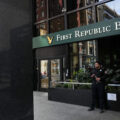 by Nicole Bassett, Director of Sustainability for PrAna. Nicole has a Master’s degree in Environmental Studies focusing on Business Strategy and Sustainability from York University in Toronto. At PrAna she oversees corporate and supply chain social and environmental impacts. Previously Nicole managed Patagonia’s Social Responsibility program and has been active in various social and environmental initiatives like the Fair Labor Association, Textile Exchange and Art Institute of California Fashion program.
by Nicole Bassett, Director of Sustainability for PrAna. Nicole has a Master’s degree in Environmental Studies focusing on Business Strategy and Sustainability from York University in Toronto. At PrAna she oversees corporate and supply chain social and environmental impacts. Previously Nicole managed Patagonia’s Social Responsibility program and has been active in various social and environmental initiatives like the Fair Labor Association, Textile Exchange and Art Institute of California Fashion program.
The introduction of prAna’s first Fair Trade Certified™ product spring of 2011 has the potential to shift the apparel industry. Apparel has a troubled history with allegations of sweat shop labor throughout the 1990’s and two decades of trying to improve labor conditions in one of the lowest paid industries around the world.
Fair Trade USA’s Apparel and Linens pilot set out to change that image in an exciting way – by using their experience from Fair Trade Certified™ agricultural products and applying it to the apparel industry. The Fair Trade model had been tested in the United States for 12 years with inspiring results. Offer a transparent supply chain, adhere to principles of Fair Trade and environmental stewardship, and consumers will respond by paying more because it is these practices that align with their own personal values.
When prAna started conversations with Fair Trade USA about participating in the Fair Trade apparel pilot it was a little different than a company coming on board with a tested product like chocolate, sugar or bananas. There was no road map; prAna would be one of the first brands to go through the entire process of bringing a product to market.
The first step was buy-in at the company to allocate the time and resources necessary to commit to the program. That actually was the easiest part. PrAna had done a project previously with a group of grandmothers in Swaziland who knit beanies to provide income to a community that lost many of its adults to HIV/AIDS. The principles of Fair Trade resonate with the prAna’s employees, consumers and the brand.
With a project like this there is the potential for it to be treated with kid gloves. PrAna could not compromise product quality or allow it to become more work for the design, development or production team. Treating it any other way would mean the project was not sustainable. If Fair Trade were going to grow for prAna it needed to fit seamlessly into the existing operations.
Fair Trade USA had worked for years developing the standards for the Apparel and Linens pilot. The standards include requirements that products be made of Fair Trade cotton, workplace standards for the manufacturing, contracts for all the players, and definition of the fees and premiums to be paid.
Fair Trade works best on transparent costing – the premium the brand pays directly to the sewing workers is based on the FOB (or price of the garment before shipping and duty costs). In addition there is a fee that prAna pays to Fair Trade USA to certify its supply chain and provide transparent, certifiable confirmation of Fair Trade practices. Successful certification grants prAna use of the Fair Trade Certified label. The fees get calculated in prAna’s costing, and help to determine the market price for the garment. By doing it this way, the price of Fair Trade is being accurately accounted for and shared between the customer and the brand.
The past 18 months involved walking through ideas that had been flushed out in incredible detail on paper, so putting it into practice proved to be exciting as it is with any new project. The project was pretty seamless save for a few bumps when it came to managing a global customer base – you see the Fair Trade Certified logo is only used in the United States, so different labels had to be made and a system developed for use on international products. While nothing changes about the production of the shirt, the certification of the manufacturing is only recognized in the United States during the pilot, so tags outside of the country just proclaim the use of the Fair Trade cotton.
There are about a dozen manufacturers who are going through the certification process with Fair Trade USA and will be available for Fair Trade production. PrAna started the program with an amazing factory in Monrovia Liberia – the 30 women at the factory are literally rebuilding their country one t-shirt at a time. In a country with an 80 percent unemployment rate, Fair Trade is a perfect program to put into place. Why start with a “race to the bottom” factory when you can start with high standards that promote economic independence and long-term sustainability for these women to help them, their families and their community. This is the opportunity that prAna can support by doing Fair Trade and the hope is that customers respond to this with the same excitement.



